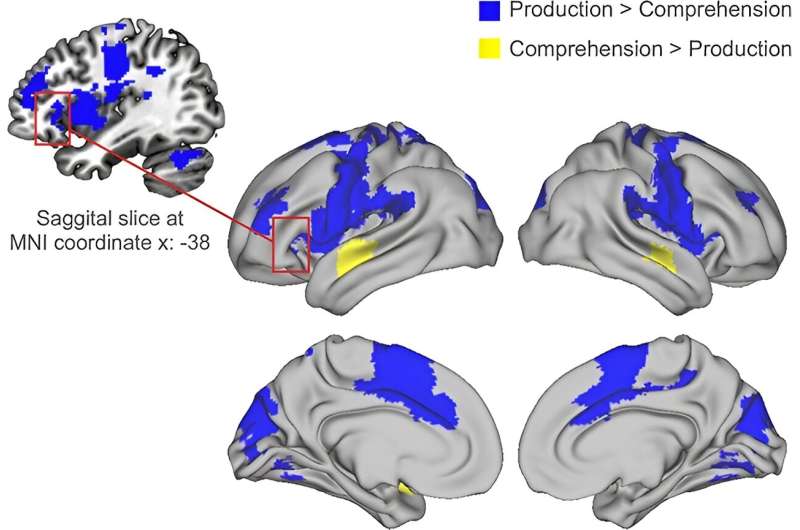This article has been reviewed according to Science X's editorial process and policies. Editors have highlighted the following attributes while ensuring the content's credibility:
fact-checked
trusted source
proofread
Functional MRI scans provide a novel view of the brain's language network during conversation

Researchers have revealed new insights into how the brain processes speech and listening during conversations through advanced investigations using functional magnetic resonance imaging (fMRI). In a study published in Cerebral Cortex, researchers compared brain activity in individuals while both speaking and listening during natural conversational situations.
Conversational interactions are central to the everyday human experience. During conversation, we use language, together with social, and other cognitive skills to flexibly switch between the roles of speaker and listener.
In research on language and the brain, there is a long-standing but still ongoing debate as to what extent speaking and listening engage the same brain regions, and by extension, the same cognitive processes. To this point, this debate had only been addressed in controlled experiments where people spoke or listened on their own.
In a study conducted by researchers at Stockholm University and KTH Royal Institute of Technology, they aimed to address this debate by comparing how the brain works when speaking and listening, for the first time during conversation.
The researchers used a publicly available data set in which participants engaged in natural conversations with an experimenter, while in the MR-scanner. During the conversations, the participant's brain activity was measured using functional magnetic resonance imaging (fMRI).
The results indicated that although both speaking and listening rely on the same brain regions in what is sometimes called the "language network," there were crucial differences. Some regions in the language network were more strongly recruited while speaking and others were more strongly recruited when listening, indicating that different language processes may be of different importance to the two activities.
The study also shows that regions typically associated with social processing were more involved in speaking as compared to listening. A possible interpretation of this finding is that speaking may put higher demands on processes related to thinking about other people's perspectives and remembering this perspective while planning one's utterance.
"This is an ability that we have demonstrated to develop during adolescence in other studies," says Caroline Arvidsson, Ph.D. student at the Department of Linguistics at Stockholm University.
The study's results highlight the ways speaking and listening share similarities but also operate differently to optimize the processing of linguistic and social information during conversation.
"We are building on research that may lead to a deeper understanding of diagnoses such as Autism and ADHD. Currently, we are testing the brain's development for conversation with adolescents with ADHD," says Julia Uddén, associate professor at the Department of Psychology at Stockholm University.
More information: Caroline Arvidsson et al, Conversational production and comprehension: fMRI-evidence reminiscent of but deviant from the classical Broca-Wernicke model, Cerebral Cortex (2024). DOI: 10.1093/cercor/bhae073




















